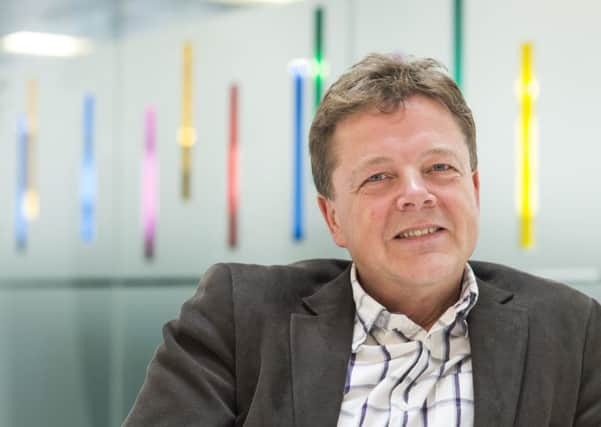Monday interview: Andrew Muir, chief executive of Farrpoint


One of three founders of IT and telecoms consultancy Farr-Point, the firm’s chief executive Andrew Muir is keen to stress that the business continues to pursue the same steady-as-she-goes strategy as when it launched in 2007.
Growth has been organic rather than via riskier activity, Muir says. “We could have probably grown a lot quicker, but we’re not driven by making millions.”
Advertisement
Hide AdAdvertisement
Hide AdHad the trio, also comprising Richard Parkinson and Calum Lamont, decided to take a more aggressive tack, they “might be a whole lot richer by now, but we wouldn’t probably have enjoyed it… We’re really not like that. I think we’re a better organisation for doing it the way we do it.”
Muir says FarrPoint has now made a strong name for itself in the public sector, with projects including telecare, smart cities and next-generation broadband coverage. It works with the likes of NHS Scotland as well as the majority of local authorities north of the Border, and has used its infrastructure knowledge to advise the Scottish Government amid plans to extend high-speed fibre broadband to about 95 per cent of the nation by the end of 2018.
Muir grew up on the north-west coast, in Achiltibuie near Ullapool, and always thought he’d be a fisherman, “because that’s what people did up there”. But his father encouraged him to pursue academia, telling him it would be “just as important and just as hard work”.
Muir set off to Edinburgh Napier University, returning home with his BSc in communication and electronic engineering, and having really taken to the telecoms part of his studies. He then worked as a lobster fisherman for about a year, but decided to put his studies into use, becoming an associate executive engineer at BT Research Labs in Ipswich, a flat landscape in sharp contrast to where he was from. “It was quite a culture shock,” Muir says.
He then completed his PhD in microstrip antennas at Aberdeen’s Robert Gordon University, followed by roles in the public sector including project manager at Highlands & Islands Enterprise (HIE) and chair of HIE Skye & Wester Ross. Moving into consultancy in the mid-1990s, he worked for a business that started to “go in different directions” with an increasing focus on London and beyond.
Consequently, FarrPoint was set up to concentrate very much on Scotland, aiming to be the main consultancy in its field north of the Border. The plan is to grow headcount from about a dozen currently to 25 to 30, and it remains highly averse to expanding too quickly.
While the business aims to triple turnover to £3 million within five years from just over £1m currently, Muir sees this as the “direction of travel” rather than a target cast in stone.
Also on the cards is adjusting some of the ratios in the business, such as increasing the percentage of its private-sector work, from about 30 per cent currently to 40, and broadening beyond Scotland, which at present contributes about 70 per cent of its activity.
Advertisement
Hide AdAdvertisement
Hide Ad“We would love to do more international work. It’s finding the opportunity because we have to have the right story to tell,” he believes, adding that its work on smart cities could prove highly applicable elsewhere.
Muir, who has also served as a member of communications regulator Ofcom’s advisory panel for Scotland, has defined a smart city as “one that improves the quality of life, increases sustainability and creates economic benefits using digital technology”.
While he sees that interpretations of the concept vary widely, he believes there can sometimes be too much attention on the technical side. “The trick is to look at it from above, and think ‘what are we trying to do to make the city work better for people and for businesses and visitors?’”
Other potential growth areas for FarrPoint include financial services, but more around newer players in the market which are highly active in mobile, rather than traditional banks struggling to keep the cogs moving with older infrastructure.
As for transferable lessons from his days working at sea, he cites the need for hard graft without the expectation of instant rewards. “You’re hauling up your creels and there’s nothing in it. You’ll get some eventually – you just have to keep plugging away. Some days you’d rather be driving a desk and some days driving a boat.”
30-SECOND CV
Born: 1964, Lincoln
Education: Achiltibuie Primary School, Dingwall Academy, Napier University, Robert Gordon University
Ambition while at school: Prawn and lobster fisherman
What car do you drive: BMW
Favourite mode of transport: Motorcycle – BMW F800GS
Music: Truly eclectic mix depending on circumstances but nearly always involving a strong beat
Kindle or book: Book
What makes you angry: Rudeness and too much moaning
What inspires you: Others getting benefit from something I’ve done, and travel
Favourite place: Badentarbet and Old Dornie in Achiltibuie, and multiple places in Pacific North West
Best thing about your job: Variety, being surrounded by really smart colleagues